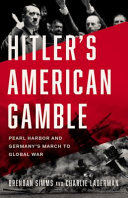2018 School Spending Survey Report
Hitler’s American Gamble: Pearl Harbor and Germany’s March to Global War
COPY ISBN
 Conventional wisdom holds that once the Japanese Empire bombed Pearl Harbor in 1941, American entry into World War II was inevitable. However, in the five days between the Pearl Harbor attack and Hitler’s declaration of war on the U.S., there was much uncertainty. Simms (history of international relations, Univ. of Cambridge; Europe and Hitler) and Laderman (international history, King’s Coll., London; Sharing the Burden) argue that the United States might not have entered the war in the immediate aftermath of Pearl Harbor, had Hitler not declared war on the nation on December 11, 1941 (thus keeping Germany’s promise to Japan). Simms and Laderman reason that the nation was still in shock at the attack; American isolationist sentiment was still strong, at least as regarded Europe; and, with congressional backing uncertain, FDR had been unwilling to ask Congress for a declaration of war against Italy and Germany. The authors provide an hour-by-hour account of December 7 to December 12, 1941, including the events of the war in Europe, and delve into American public sentiment and the sentiment of the press to illustrate the uncertainty that still existed between December 7 and 12.
Conventional wisdom holds that once the Japanese Empire bombed Pearl Harbor in 1941, American entry into World War II was inevitable. However, in the five days between the Pearl Harbor attack and Hitler’s declaration of war on the U.S., there was much uncertainty. Simms (history of international relations, Univ. of Cambridge; Europe and Hitler) and Laderman (international history, King’s Coll., London; Sharing the Burden) argue that the United States might not have entered the war in the immediate aftermath of Pearl Harbor, had Hitler not declared war on the nation on December 11, 1941 (thus keeping Germany’s promise to Japan). Simms and Laderman reason that the nation was still in shock at the attack; American isolationist sentiment was still strong, at least as regarded Europe; and, with congressional backing uncertain, FDR had been unwilling to ask Congress for a declaration of war against Italy and Germany. The authors provide an hour-by-hour account of December 7 to December 12, 1941, including the events of the war in Europe, and delve into American public sentiment and the sentiment of the press to illustrate the uncertainty that still existed between December 7 and 12.
VERDICT The authors effectively prove their thesis in a key volume for World War II history collections.
RELATED
ALREADY A SUBSCRIBER? LOG IN
We are currently offering this content for free. Sign up now to activate your personal profile, where you can save articles for future viewing




Comment Policy:
Comment should not be empty !!!